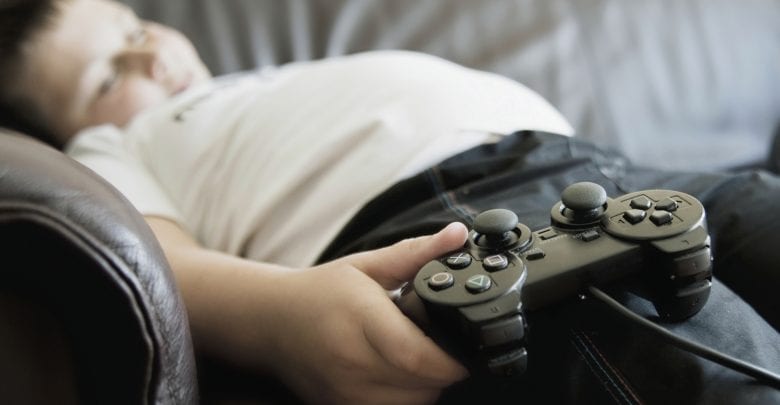
Video games help improve health of obese children: Study
ألعاب الفيديو تساعد الأطفال المصابين بالسمنة على إنقاص الوزن
Cheer up video game lovers! According to a new research, video games can help improve the health in obese children.
The new study from LSU’s Pennington Biomedical Research Center showed for the first time that video games, in combination with fitness coaching and a step tracker, helped overweight children lose weight, lower their blood pressure and cholesterol and increase their physical activity.
“Kids who gain excessive weight and are not physically active can develop early signs of heart disease and diabetes. They may also struggle every day with asthma, sleep apnea, and the other psychological and health challenges that excess weight and obesity can bring,” said Dr. Amanda Staiano, study’s primary investigator.
“Screens are everywhere in our lives, and they are here to stay. Kids spend half their waking hours in front of screens,” said Dr. Staiano. “I’m looking for ways to use those screens — smartphones, computers, televisions and tablets — to incorporate more physical activity into kids’ lives.”
The GameSquad study enrolled 46 children ages 10 to 12 who were overweight or had obesity.
The gaming group was encouraged to meet the national recommendations of 60 minutes per day of physical activity. The children received an Xbox 360, Kinect and four exergames (Your Shape: Fitness Evolved 2012, Just Dance 3, Disneyland Adventures and Kinect Sports Season 2) and were asked to play these at their home with a friend or family member for six months.
They also received a “challenge book” to complete three one-hour gaming sessions each week and a Fitbit to track their steps each day. Each child and parent or parents also took part in regular video chats over the video game console with a Pennington Biomedical fitness coach to monitor their progress.
The control group members were not asked to make any changes in their behaviour. These families received the exergames and gaming console at the end of the six-month study.
Twenty-two of the 23 families in the gaming group finished the six-month program. Children and parents in the gaming group completed 94 percent of the gaming sessions and attended 93 percent of the video-chat sessions. “When you don’t intervene with kids who are overweight, often their health risk factors and health behaviours worsen over time,” said Dr. Staiano.
“So, unfortunately, we weren’t surprised to see that kids in the control group increased blood pressure and cholesterol and decreased physical activity over the six-month period.”
Children in the gaming group:
-Reduced their body mass index by about 3 percent while the control group increased their BMI by 1 percent.
-Reduced their cholesterol by 7 percentiles while the control group increased cholesterol by 7 percentiles. In other words, the kids in the gaming group remained in the healthy range. The increase in the control group’s cholesterol levels pushed them into the borderline category for high cholesterol.
-Increased their physical activity by 10 percent while the control group decreased their physical activity by 22 percent.
-Increased their self-efficacy, or their belief about personal control, toward physical activity, which predicts exercise adherence.
The study has been published in the journal Pediatric Obesity.
أفادت دراسة أمريكية حديثة، أن ألعاب الفيديو، بالاشتراك مع تدريبات اللياقة البدنية، تساعد الأطفال المصابين بالسمنة على إنقاص الوزن وخفض ضغط الدم والكولسترول وزيادة النشاط البدني.
الدراسة أجراها باحثون بمركز “بنينجتون” لأبحاث الطب الحيوي في جامعة ولاية لويزيانا الأمريكية، ونشروا نتائجها، في العدد الأخير من دورية (Pediatric Obesity) العلمية.
وللوصول إلى نتائج الدراسة، راقب الفريق 46 طفلاً تتراوح أعمارهم بين 10 إلى 12 عامًا ويعانون من زيادة الوزن والسمنة، وكان نصفهم من البنات.
وقسم الفريق المشاركين إلي مجموعتين، الأولى مارست حياتها بشكل طبيعي، فيما قامت المجموعة الثانية بتنفيذ برنامج يعتمد على ممارسة النشاط البدني لمدة ساعة واحد يوميًا، بالإضافة إلى ممارسة ألعاب الفيديو لمدة 3 ساعات أسبوعيًا، بشكل فردي أو مع مجموعة، لمدة 6 أشهر.
وشارك الأطفال بالمجموعة الثانية في محادثات فيديو منتظمة عبر وحدة تحكم ألعاب الفيديو مع مدرب لياقة بدنية من لمتابعتهم ورصد تقدمهم في ممارسة التمارين الرياضية.
وعقب انتهاء فترة الدراسة، وجد الباحثون أن المجموعة التي مارست التمارين وألعاب الفيديو انخفضت لديها مؤشر كتلة الجسم بنسبة 3% بينما زادت لدى المجموعة الأخرى بنسبة 1%.
كما انخفضت نسبة الكولسترول في الدم لدى المجموعة الثانية بنسبة 7%، بينما زادت لدى المجموعة الأولى بنسبة 7%.
وزاد لدى المجموعة الثانية النشاط البدني بنسبة 10%، في حين انخفض لدى المجموعة الأولى بنسبة 22%.وقالت الدكتورة أماندا ستايانو، قائد فريق البحث: “الأطفال الذين يكتسبون وزنًا زائدًا وغير نشطين جسديًا يمكن أن يصابوا بعلامات مبكرة لأمراض القلب والسكري، قد يعانون أيضًا من الربو وتوقف التنفس أثناء النوم وغيرها من التحديات النفسية والصحية التي يمكن أن تجلبها السمنة”.
وأضافت أن “الشاشات موجودة في كل مكان في حياتنا، حيث يقضي الأطفال نصف ساعات يقظتهم أمام الشاشات مثل التلفزيون والموبايل والكمبيوتر والأجهزة اللوحية، لذلك فإننا تسعى لاستخدامها كأداة لتعزيز النشاط البدني في حياة الأطفال”.
وكانت دراسة سابقة ذكرت أن إصابة الأطفال بالسمنة في عمر مبكرة تعرضهم لخطر انخفاض معدلات الذاكرة والذكاء، وتؤثر على أدائهم في الاختبارات الإدراكية.
ووفقا للمراكز الأمريكية للسيطرة على الأمراض والوقاية منها (CDC)، فإن إصابة الأطفال بالسمنة المفرطة، تعد مصدر قلق كبير على الصحة العامة في أمريكا؛ حيث تصيب نحو 17% من الأطفال والمراهقين (بين عامين و19 عامًا)، ما يعرضهم لزيادة خطر إصابتهم بالأمراض المزمنة مثل داء السكري وأمراض القلب والأوعية الدموية.



